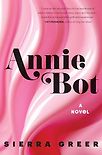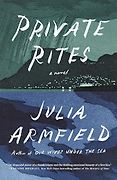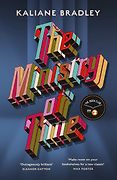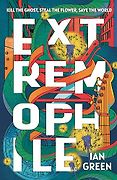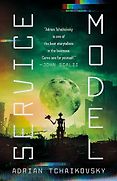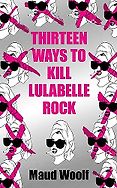For readers unfamiliar with the prize, could you introduce us?
Sir Arthur C. Clarke wanted to give something back to the British science fiction community – odd, since he’d done so much over the decades. There was briefly talk of a magazine, but it was decided that an award should be set up. For many years, he funded the prize money, but now the Serendip Foundation raises the money. We had two judges from the British Science Fiction Association, two from the Science Fiction Foundation and initially two from the International Science Policy Foundation. Our judges have included scientists, writers, journalists, academics, and critics, most of whom serve two years. Collectively, they select a short list of the best science fiction novels published in Britain, from more than a hundred submissions, and then they choose a winner. The ISPF dropped out at some point, so we have a single judge from the good folk of the Sci-Fi-London film festival. The first winner was Margaret Atwood’s The Handmaid’s Tale, which was controversial at the time because it hadn’t been marketed as science fiction.
What are the judges looking for in a book?
It varies from judge to judge. We don’t define ‘best’ or ‘science fiction’ or even ‘novel’ for them – we’ve shortlisted books with illustrations and poems before. Some of the judges look for a novel that fits firmly into the tradition of science fiction but still feels new. One of this year’s judges looks for a science fiction vibe – they wanted great novels that had a science fiction flavour. Some judges seek titles that they can thrust into the hands of people who dismiss science fiction as just entertainment. The winning book has to survive rereading, as typically the judges reread the shortlist. The winner will make them think, but it might make them cry or make them angry.
The first book on the list is Private Rites.
It’s focused on sisters in a near-future Britain ravaged by the climate catastrophe and concerned with the illness and then death of their father. It’s a variant on King Lear, which of course doesn’t end well, and it nods to horror, even folk horror. The family is falling apart, and its secrets are beginning to surface. It’s a far from comforting book.
Two nominations this year feature climate collapse. Was this a common theme this year?
It was, along with the apocalyptic in general. That’s nothing new. Richard Jefferies flooded London in 1885 and Ballard did it in 1962. We seem to take a perverse pleasure in the end of the world – even when it seems all too plausible in our near future.
The second nomination is a debut novel: Kaliane Bradley’s The Ministry of Time. Please introduce us! Why is this one of the best sci fi books of 2025?
It’s a page-turning account of the scooping of a number of people out of the past and then what happens to them when they end up in a near future. One of them is Commander Graham Gore, who in our world died in Sir John Franklin’s attempt to cross the Northwest Passage in the Arctic, and has a present-day minder to help him cope with the inevitable culture clash. Both main characters are utterly believable and you wait for what seems to be the inevitable romance to develop. It’s become hugely popular in the BookTok community and I look forward to more novels from her.
Time travel, with multiple selves and timelines, is a popular sci fi trope. What’s fresh in Bradley’s take?
Time travel can get bogged down with paradoxes and other complications. It can feel like a logic puzzle – there’s one classic story, which I won’t name because of spoilers, where the main character becomes both his parents and indeed all the characters in the story. Or there’s the “Let’s kill Hitler” cliché. Bradley uses paradox more subtly, but it’s characterisation and character development which sold it to me – who is Gore and how will the narrator relate to him?
Next, we have Extremophile by Ian Green. Tell us about this one and why it’s been chosen.
The author has previously written fantasy and I think this is the first novel-length science fiction he’s published. It’s a caper, set in a climate-damaged near-future London, where a high-risk heist might save the world. Some of it is bound to go wrong and there’s a very densely imagined culture. There is an undercurrent of anger at what we are doing to our world and how corporations treat people – rather like Ned Beaumann’s Venomous Lumpsucker, which won a couple of years ago. In fact, there’s anger in a couple of the books. Again, it’s very promising work.
This book is filed as ‘biopunk’ – could you tell us a bit about that label?
With the success of cyberpunk forty years ago, there was a vogue for naming any new subgenre somethingpunk – steampunk, hopepunk, solarpunk and of course biopunk. It’s like every scandal having the word -gate stuck on the end. Some of the original cyberpunk stories had genetic and biological modification alongside implanted computer chips and virtual reality, but some people find it useful as a term. Your typical biopunk protagonist has modified DNA, which changes where they can live or how long they live. It might be they can photosynthesise rather than needing to eat. There’s usually a dodgy black market and corrupt multinational corporations, with quite a lot of overlap between the two. Again, that’s rather cyberpunk.
The fourth shortlisted book is Sierra Greer’s Annie Bot, which was book of the month for The Times and The Guardian. What’s it about, and why has it been so well received?
Annie is a companion, a manufactured housewife who is programmed to keep her husband happy. The husband’s best friend is a jerk and mistreats Annie, whilst the husband gets more and more unpleasant. If she were a real woman, you’d be thinking this is coercive control, but if it’s just a machine… well, it gets messy. The judges spent a lot of time talking about the ethics of the novel and what they made of the husband. I think that’s the mark of a great book – it leaves you with questions.
Sci fi has written about AI for decades, but reality is catching up. How futuristic does Annie Bot feel?
I think if it was about real AI then Annie would be a lot more deluded than she is! She’d be hallucinating rather than misjudging things. It’s very traditional in some ways – there are hints of The Stepford Wives, the film anyway, but Annie is more isolated. She’s like a 1950s housewife in some ways – which most women weren’t like even at the time.
Your next choice features another rebellious robot: please tell us about
Service Model by Adrian Tchaikovsky
I’m not sure I see Charles as rebellious – it’s just obeying its programming. (Have you read The Good Soldier Švejk, where the main character keeps getting into trouble for obeying orders?) Charles is a robot valet, whose master has died; in fact Charles may have murdered him. Hmm, I guess that’s rebellious!
Charles first has to negotiate the medical and police services and then the fact that it is unemployed. It spends the rest of the novel trying to find a new master. There’s a curious collision between Charles’s seemingly reasonable logic and the rather colder logics of the organisations it encounters. There’s also a sense of anger peppering the novel.
The book is humorous – which is hard to do well. Does funny sci fi often make the shortlist?
I got in trouble about fifteen years ago when I said that I thought it was hard for a comic novel to win the award – The Guardian twisted this into my dismissing Terry Pratchett, whose novels I love. Humorous books can make profound points, but if you say that then you risk ending up in Pseud’s Corner for spoiling the joke. Glancing through nearly forty years of shortlists, it’s hard to spot that many comedies. Venomous Lumpsucker is very funny at times, and there’s been a thread of satire and black humour over the decades. Nana Kwame Adjei-Brenyah’s Chain-Gang All-Stars leaps from comic moments to making you cry or provoking anger. Several of the shortlist made me chuckle, but that could just be me. I suspect that Tchaikovsky is looking to Douglas Adams as well as to Franz Kafka and it wouldn’t surprise me if there wasn’t some Tom Stoppard in the mix. And there’s John Sladek’s Roderick/Roderick at Random from the early 1980s, which is another novel about a robot stuck in a maze of logic taken to absurdity.
We’ve come to the last book on your list. What’s the premise of Maud Woolf’s Thirteen Ways to Kill Lulabelle Rock? Why were the judges drawn to this one?
There’s a very strong narrative which gripped them – a clone has to destroy all her previous copies and survive the attempt. If the plan was followed through, then it might get a bit tedious, but, rather like Killing Eve, there are spanners in the works. There’s also a moral dilemma of whether the clones deserve to die. Does it say something about the world we live in that this and Service Model are the most fun books on the short list? Like I say, science fiction humour is often dark.
This is another debut novel. It’s always exciting to find a new voice. What makes Woolf’s voice stand out?
She’s very engaging and she makes us care about her characters, and there’s a subtle exploration of gender expectations – what roles do we expect women to take up and which might be inappropriate? What sacrifices are we prepared to make to succeed? Woolf builds a complex and rich world without spelling things out in exact detail, and she avoids going for the obvious.
It sounds like an excellent shortlist. What did the judging process tell you about the state of sci fi in 2025?
It reminded me that two people can have completely opposite views about the same book. And you can see that both of them are right, although that can make constructing a shortlist tough. As you’ve suggested, climate catastrophe is a common thread, as it has been for years, and the postapocalyptic. I don’t think that we had any novels featuring viruses this year and we didn’t shortlist any space opera, which I confess surprises me. There’s a lot of variety in what is getting published.
Looking through the shortlist, we have a lot of diversity in LGBTQIA+ characters, and this is integrated into the storytelling – the assumptions we make about gender identity are tested in several of the novels. There was no danger of an all-male shortlist this year, as has happened in the past – arguably science fiction began with a woman in her teens, and it’s important to read a diversity of voices. It would be great to see more writers of colour on the shortlist, but either we are seeing the few books that are being written, or not much of it is being submitted.
But we have five very different authors who are new to writing adult science fiction and one previous winner who is doing something different, which I think bodes well for the future. We received over a hundred books last year and we don’t get to see everything. I wouldn’t dare to guess which book would win – it genuinely could be any of the six.
Interview by Sylvia Bishop
June 19, 2025. Updated: December 7, 2025
Five Books aims to keep its book recommendations and interviews up to date. If you are the interviewee and would like to update your choice of books (or even just what you say about them) please email us at [email protected]
Five Books interviews are expensive to produce. If you've enjoyed this interview, please support us by donating a small amount.

